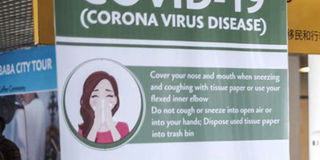Friends, we are caught between the devil and the deep blue sea

The government Friday announced a raft of measures that will significantly change the way Kenyans live. PHOTO | EDUARDO SOTERAS | AFP
What you need to know:
- True, we have always had far deadlier killers in Africa such as malaria.
- Within a very short time you will have thousands of infected people.
- Almost certainly there are many more infected persons going about undetected.
A friend has been complaining that the government is probably exaggerating the coronavirus threat. The other day he reminded me that we have only seven confirmed cases (as of Wednesday). True, we have always had far deadlier killers in Africa such as malaria. Yet this attitude to downplay coronavirus is mistaken.
This virus poses a very different kind of threat. The previously unknown bug so far has no cure, unlike malaria, which antibiotics efficiently heal. Worse, its mutation patterns are unfamiliar. But what should truly frighten us is the way it is spreading across the world. It is highly contagious.
My friend talked of just seven Kenyan cases. However, keep in mind that the virus spreads exponentially.
Take those seven infected persons as a starting point. Assume these persons interacted and infected seven others, then all 14 infected another 14, and on and on and on.
INFECTED PEOPLE
Within a very short time you will have thousands of infected people. Even if as it happens only a small fraction of them will get sick to need hospitalisation, Kenya quite simply won’t cope.
There is another inherent problem we must face. Health CS Mutahi Kagwe revealed on Thursday that the government had at that point carried out coronavirus tests on 173 people.
That figure is too low. We must ask, what is our testing capacity? When we talk of seven cases, those are the ones the authorities had confirmed.
Almost certainly there are many more infected persons going about undetected. That is the situation all over the world.
In Europe and America, there is a huge gulf between the numbers of those tested and those who experts believe are infected but undiagnosed.
As the World Health Organization has warned, countries trying to manage the coronavirus pandemic without reliable data from mass testing are basically fighting blind. Asian countries have done better. South Korea and Singapore in particular have been superb in mass testing.
STEEP CURVE
The infection rate is explained through something being called the “curve.” A steep “curve” is what you see in countries where the number of infected persons is spiking exponentially. That was the case with China and Italy initially.
It was the case with other countries that were slow to respond to their infection surge. More crucially, the faster the infection “curve” rises, the quicker healthcare systems get overloaded beyond capacity.
What every affected country is now working to do is to “flatten the curve” so as to better manage hospital capacity. In Kenya, if we don’t do whatever it takes to check against exponential growth, we will reach a catastrophic tipping point.
Then we will be in really, really big trouble.
We are seeing countries across the world adopting various strategies to confront coronavirus. South Africa, with the highest confirmed infection numbers in sub-Saharan Africa, has declared a ‘state of disaster’. Sudan went one further and announced a medical state of emergency.
SELF ISOLATION
Britain has gradually been moving away from its much-criticised ‘mitigation’ strategy, which aims to merely slow the spread of the pandemic through measures seen as passive, like voluntary – as opposed to mandatory – self-isolation for those with primary symptoms.
On Friday, the British government decided to take some more robust steps, starting with closure of schools.
Other countries have opted for the more aggressive ‘suppression’ strategy, which seeks to reverse the pandemic’s growth. African countries, which have had the benefit of observing how coronavirus was ravaging other continents whilst Africa remained relatively unscathed, will only have themselves to blame if they don’t adopt the containment strategy early enough.
Many are doing so, requiring suspect cases to undergo compulsory quarantine. Tight border and airport controls have been introduced, as has strict screening of international travellers. Protocols that are being implemented elsewhere have also been embraced by African countries, like that of employees who can work from home to do so.
SOCIAL FUNCTIONS
The other is the practice of “social distancing” and avoidance of crowds as at sports events, social functions, and even religious services.
The most stringent strategy is the lockdown. That is where Italy, Spain and, lately, France are right now.
Wuhan, the Chinese city that recorded the first coronavirus outbreak, is only now slowly emerging from shutdown.
A full lockdown means everybody gets confined to their homes. Exemptions cover police and health workers. Public transport is shut down. All frontiers, airports and seaports are sealed. A country is basically locked down.
Can Kenya afford a lockdown? We are a poor country where the majority live from hand to mouth. Our dilemma is the survival of our livelihoods or survival itself. It’s a terrible choice. We are indeed caught between the devil and the deep blue sea.





